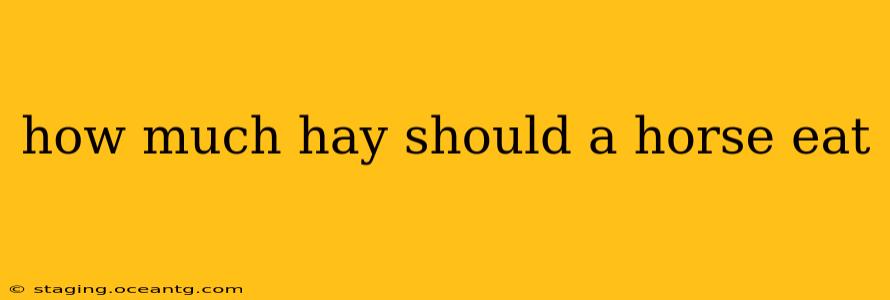Determining the appropriate hay intake for your horse is crucial for maintaining their health and well-being. Underfeeding can lead to weight loss, nutritional deficiencies, and compromised immune function, while overfeeding can result in obesity, colic, and other health problems. This guide will delve into the factors influencing a horse's hay requirements, providing you with the knowledge to make informed decisions.
What Factors Determine a Horse's Hay Needs?
Several factors contribute to the individual hay requirements of a horse. There's no one-size-fits-all answer. Understanding these variables is key to proper feeding:
-
Body weight: Larger horses naturally require more hay than smaller ones. A weight tape or veterinary assessment is the best way to accurately determine your horse's weight.
-
Body condition score (BCS): This is a visual assessment of your horse's fat reserves, typically scored on a scale of 1 to 9. A BCS of 5 is considered ideal. Horses that are underweight need more hay, while overweight horses need less.
-
Activity level: Horses engaged in strenuous work or exercise will burn more calories and require more hay to meet their energy demands. A horse in light work will need less than a horse in heavy work.
-
Age: Foals, young horses, and senior horses have different nutritional needs than adult horses. Foals require more energy for growth, while seniors may need adjustments to address age-related digestive issues.
-
Breed: Some breeds naturally have higher metabolisms than others. This should be considered when determining hay intake.
-
Hay quality: The nutritional content of hay varies significantly depending on the type of grass, growing conditions, and harvesting methods. High-quality hay with higher nutrient density may require less volume to meet a horse's needs compared to lower-quality hay.
-
Other feed: If you're supplementing your horse's diet with grain, concentrates, or other feeds, you'll need to adjust their hay intake accordingly to avoid overfeeding.
How Much Hay Should My Horse Eat Daily?
As a general guideline, most adult horses need approximately 1.5% to 2% of their body weight in dry hay per day. This translates to roughly 15-20 lbs of hay for a 1000 lb horse. However, this is just a starting point. It's vital to consult with your veterinarian or an equine nutritionist to create a personalized feeding plan for your horse. They can assess your horse's individual needs based on the factors discussed above.
What if My Horse is Overweight or Underweight?
Overweight horses: Reduce the amount of hay gradually to promote weight loss. Consult your veterinarian to develop a safe and effective weight-loss plan. They might suggest using a lower-calorie hay or supplementing with a low-calorie balancer.
Underweight horses: Gradually increase the amount of hay to help your horse gain weight. Ensure the hay is of good quality to provide sufficient nutrients. Your vet might recommend supplements to address any nutritional deficiencies.
How Often Should I Feed My Horse Hay?
Ideally, horses should have access to hay freely throughout the day. This mimics their natural grazing patterns and helps prevent digestive problems like colic. Smaller, more frequent feedings are better than one or two large feedings. Using a slow feeder hay net can further slow down consumption, promoting better digestion and preventing gulping.
What Types of Hay Are Best for Horses?
Different types of hay offer varying nutritional profiles. Grasses such as Timothy, Orchard grass, and Bermuda grass are generally good choices for adult horses. Legumes like Alfalfa are higher in protein and calcium, making them suitable for growing horses, pregnant mares, or those recovering from illness, but they may not be appropriate for all horses due to their higher calorie content. Always check the hay for mold, dust, or other contaminants before feeding it to your horse.
My Horse Doesn't Seem to be Eating Enough Hay, What Should I Do?
Several factors can lead to decreased hay intake. This includes dental problems, illness, pain, or simply a preference for other feed. If you notice a significant decrease in hay consumption, consult your veterinarian immediately to rule out any underlying health issues.
By understanding your horse's individual needs and following these guidelines, you can ensure they receive the proper amount of hay, promoting their overall health, happiness, and longevity. Remember, regular monitoring of your horse's body condition and consultation with an equine professional are essential for maintaining optimal nutrition.
